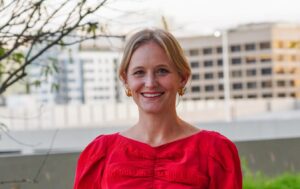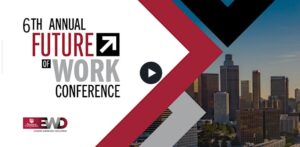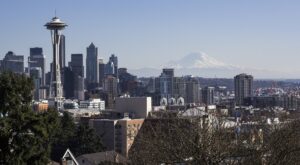
The FOW Panel One: What’s News with Training, Trades, and Transformations
Pam Sornson, JD
December 5, 2023
An enormous volume of information and insight emerged from the Future of Work Conference (FOW) hosted on October 26th by the Economic and Workforce Development division (EWD) of Pasadena City College (PCC). The past two editions of the Pulse covered several elements of the conversation:
The three keynote speakers, California Labor and Workforce Development Agency leader Secretary Stewart Knox, California Senator Anthony Potantino, and Union Station Homeless Services CEO Anne Miskey, shared their vision of today’s economic situation as they see it through their particular lens.
Opinions offered by the elected officials in attendance, California Assemblymember Mike Fong and Pasadena City Mayor Victor Gordo, revealed their perspectives on how EWD initiatives impact their constituents.
The two panels of industry experts discussed each of the two overarching conference themes:
How education can (and should) lead the way to a stronger economy and
How to revolutionize worker pathways to ensure qualified applicants are available for current and emerging jobs in high-demand industries.
There were very well-educated and experienced professionals sharing high-level insights on what needs to be done to improve California’s economy. However, the actual content that came out of those two panel discussions has not yet been covered.
In the last Pulse edition, we presented an overview of the questions we asked each of our panel participants. Their comprehensive responses enlightened both their colleagues on the dias and the ~200 attendees about the subtle nuances at play in this complex system of education, government, and industry. In this article, we will share the data offered by Panel One participants. This edition’s second article explores the subjects the other group was talking about.

Panel One Topic: Training, Trades, and Transformation of Pathways
Each of the three panelists shared how their individual experiences in life drew them into EWD issues and how their occupations have led them to their current role as leaders in their sector.
County Agency Leader Kelly Lobianco
Kelly Lobianco, the inaugural leader of LA County’s Department of Economic Opportunity (DEO), spoke about how working with veterans in New York City early in her career helped her understand the power of the pivot. The center she helped to develop was unsuccessful until they realized their services weren’t available where the veterans happened to be – restructuring the organization made it more helpful for its intended population and more sustainable as a viable resource.
In her role with the new LA County agency, she gets to apply a similar mindset to her department’s emerging challenges. The DEO is a mashup of several previously individual departments that operated separately, even though they shared many common goals and resources. Now, as a combined force, the new organization is focusing on leveraging the assets available through the American Rescue Plan and the Infrastructure Investment and Jobs Act to improve the fortunes of LA County’s workforce stakeholders.
She notes, in particular, how the new funding brings with it a focus on socially beneficial elements and how they can enhance the success of every project. She expects her team to include needed social services and resources within any EWD project they’re working on.
She also shares her agency’s augmented attention to equity issues. As she learned in NYC, funds must be deployed where they’re needed, so she’s working on ensuring that people can access whatever resources they need to move forward, regardless of where they live within the county.
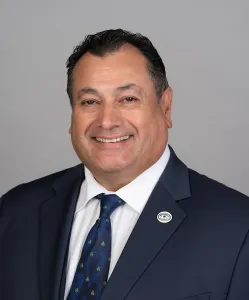
Union and Labor Leader Ernesto Medrano
As a long-time Union advocate and current Executive Secretary of the Los Angeles/Orange Counties Building and Construction Trades Council, Ernesto Medrano came to his understanding of the work world when laboring at a local fast food restaurant in the 1970s. Even then, he was concerned about the economic and life challenges presented to people with few or no trained skills, and that exposure ultimately led to his role in Union leadership.
These days, he’s tracking the diversity gap in the building trades (which are a critical element of the Infrastructure Bill), as well as perceived barriers to the educational resources that lead to jobs and careers. The federal government, he notes, is putting millions of dollars into career training programs to ensure a sufficient supply of well-trained workers for existing and emerging job openings. As a strong champion of the community colleges, Medrano sees them as critical players in the workforce development environment. He’s working now with PCC to develop courses that feed the demand for workers in specific trades. The rise in apprenticeship opportunities also bodes well for those who score those positions and the companies and industries in which they will work.
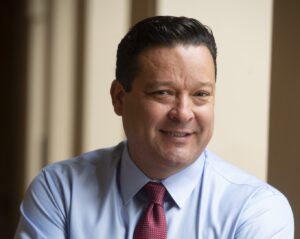
Pasadena City Mayor Victor Gordo
Mayor Gordo represents a significant population within the LA region: he’s a Mexican immigrant who experienced employer exploitation as a young man and became a labor lawyer to combat those systems. As Mayor, he’s struck by how ‘both sides’ of the EWD strata — employee and employers — often share identical concerns: there are not enough resources available to address all the challenges they (individually) face. He describes it as a ‘disconnect’ between job seekers and job offerers because neither group seems to know what the other group is doing. From his chair, improved communication between the two will go a long way to alleviating the divide.
He also sees EWD initiatives as projects with many layers. Not only must open jobs be filled by qualified workers but ladders must also be built within those occupations to facilitate their upward mobility.
As a civic leader, Gordo’s attention is on embracing new businesses and industrial sectors and the EWD opportunities they bring to the table. In Pasadena, he asserts, there’s been a boom in the biotech sector, which has led to an expansion of innovation and the growth of new sub-industries. Those new jobs come with new skills, and Gordo sees Pasadena City — and Pasadena City College — as major players in finding the training resources those workers will need. He also sees the need for a broad-based educational strategy because, he aptly shares, “there is no one pathway to success.”
To get the full skinny on what went down on October 26th, you can stream the replay here. To learn what Panel Two participants had to say about revolutionizing worker pathways to occupational success, read on to our next article in this edition of the Pulse.

